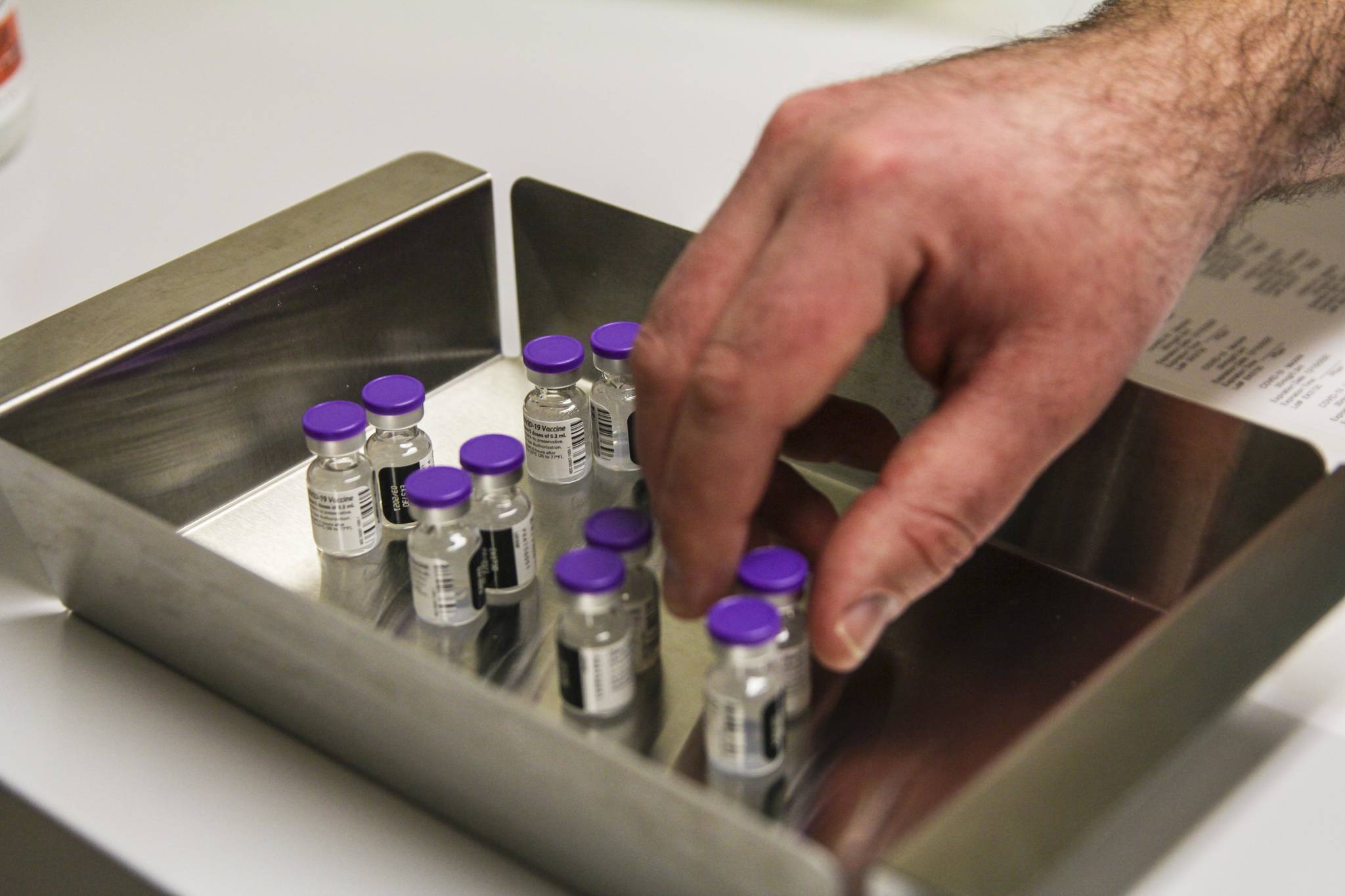A health care worker at Bartlett Regional Hospital in Juneau had an adverse medical reaction after receiving Pfizer/BioNTechs’s COVID-19 vaccine, said national, state and local health officials in a Wednesday morning news conference.
The woman who suffered the adverse reaction was simply identified as middle-aged health care worker.
“Late in the afternoon, we had one of the health care workers get the vaccine. About 10 minutes later, she felt flushed, so she took a Benadryl on her own,” said Dr. Lindy Jones, medical director for emergency operations at BRH, in the news conference. “When she arrived at the ER, she was feeling short of breath. She was not wheezy. Her heart rate was elevated.”
The patient was treated for anaphylactic shock, with first one, then a second dose of epinephrine, before being put on an epinephrine drip and steroids, a standard treatment for anaphylactic shock, Jones said. The patient also received antihistamines. The patient had no history of allergic reactions to vaccines before this, said BRH spokesperson Katie Bausler in an email.
In response to the adverse reaction, the hospital notified the federal Centers for Disease Control and Prevention, using the Vaccine Adverse Event Reporting System, said Dr. Anne Zink, Alaska’s chief medical officer, during the news conference.
This is the first reaction of its kind in the United States, said Dr. Jay Butler, the CDC’s Deputy Director for Infectious Disease, during the news conference, though similar reactions have occurred elsewhere.
A second hospital staff member also experienced mild adverse symptoms to the vaccine on Wednesday, Bartlett Regional Hospital announced Wednesday evening. The other staff member’s symptoms included puffy eyes, a scratchy throat and lightheadedness after being injected with the vaccine.
He was treated with epinephrine, Pepcid and Benadryl and felt normal within an hour, according to the hospital.
“We do recommend the vaccine is administered in a setting where there are the supplies available to treat anaphylaxis,” Butler said. “We are aware that there are two cases of anaphylaxis reported last week with the receipt of the Pfizer/BioNTech vaccine in England.”
The CDC has clear guidelines and systems in place to monitor those receiving the vaccine, Butler said, which BRH followed closely and effectively.
“So far this is the only case in the United states. There may be more,” Butler said. “We can follow the example of Dr. Jones and his colleagues at Bartlett using the VAERS system to report any events that occur.”
The mechanisms for protecting people from adverse effects were set up well in advance, Butler said, and the guidelines for treatment are widely available.
“The advisory committee has put out guidelines that are available on the CDC website. We recommend that anyone who has had a severe reaction to the vaccine should forgo any sort of follow-up dose,” Butler said. “Anyone who’s receiving the currently available COVID vaccine should be observed for 15 minutes. People with a severe reaction to any vaccine or drug should be monitored for 30 minutes.”
While those who receive only a single dose have demonstrated partial efficacy in immunization from the coronavirus, Butler said, it’s considerably less effective than the two-dose system in place.
“Anaphylaxis is a known, although very rare, side effect with any vaccine,” said Dr. June Raine, executive of the United Kingdom’s Medicines and Healthcare Products Regulatory Agency in a news release. “Most people will not get anaphylaxis and the benefits in protecting people against COVID-19 outweigh the risks.”
The health care worker is in good condition, Jones said, and she still encourages others to get vaccinated.
“She is healthy and doing well. We’re just monitoring her,” Jones said. “It’s my understanding that the plan is to discharge her this evening assuming there’s no further symptoms now that she’s off medication.”
Health care workers who received the vaccine yesterday told the Empire they felt fine after receiving the shot. At least 96 people had received the vaccine in Bartlett Regional Hospital, as of Wednesday morning, with this being the sole case of an adverse reaction. The reaction will not affect the patient’s job, Bausler said.
• Contact reporter Michael S. Lockett at (757) 621-1197 or mlockett@juneauempire.com.

